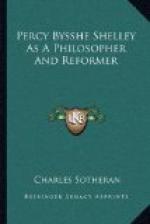After the death of his first wife, on the solicitation of Godwin, who was anxious for the landed interests of his grandchildren, a legal union was performed. After looking on this episode, in the most charitable manner, I am confident the sternest moralist cannot but “acknowledge that the passionate love of a boy should not be held a serious blemish, in a man whose subsequent life was exceptional in virtue and beneficence.”
Believing, as I have explained, in the divinity of love, Shelley regarded everything in the relation of the sexes with the most intense horror, which was not consistent with “freedom;” and by which he most certainly did not signify the license attributed by many. When he looked around and saw the withering blast of forced marriages, conjugal hatred and prostitution, can we be astonished at his passionately exclaiming:
“Even love is sold;
the solace of all woe
Is turned to deadliest
agony, old age
Shivers in selfish beauty’s
loathing arms,
And youth’s corrupted
impulses prepare
A life of horror from
the blighting bane
Of commerce, whilst
the pestilence that springs
From unenjoying sensualism,
has filled
All human life with
hydra-headed woes?”
In a most important essay bearing on this passage, which should be widely studied, he observes:
“Love is inevitably consequent upon the perception of loveliness. Love withers under constraint; its very essence is liberty; it is compatible neither with obedience, jealousy, nor fear; it is then most pure, perfect, and unlimited, where its votaries live in confidence, equality, and unreserve.”
He then urges:
“A husband and wife ought to continue so long united as they love each other. Any law which should bind them to cohabitation for one moment after the decay of their affection, would be a most intolerable tyranny, and the most unworthy of toleration; and there is nothing immoral in this separation, for love is free. To promise forever to love the same woman, is not less absurd than to promise to believe the same creed.”
He states categorically that
“The present system of constraint does no more, in the majority of instances, than make hypocrites or open enemies. Persons of delicacy and virtue, unhappily united to those whom they find it impossible to love, spend the loveliest season of their lives in unproductive efforts to appear otherwise than they are, for the sake of the feelings of their partners or the welfare of their mutual offspring; and that the early education of their children takes its color from the squabbles of the parents. They are nursed in a systematic school of ill-humor, violence, and falsehood, and the conviction that wedlock is indissoluble holds out the strongest of all temptations to the perverse. They indulge without restraint in acrimony and all the little tyrannies




